|
Highlights from Thursday, 21 April
On Thursday, CSD-13's high-level segment focused on turning political commitments into action, starting with an interactive discussion involving representatives of UN organizations, regional commissions, specialized agencies and Bretton Woods Institutions. This was followed by presentations from invited speakers, statements from ministers and other high-level government officials, and an interactive session with Major Groups. Delegates also continued to negotiate the Chair's revised outcome document, with steady progress reported by Thursday evening. |
|
|
| JoAnne DiSano, Director, Division for Sustainable Development, Mikhail Gorbachev,
Green Cross International, Under Secretary-General for Economic and Social Affairs Jose Antonio Ocampo, CSD Chair John Ashe and CSD Secretary Vivien Pliner-Joseph. |
|
During discussions on the theme of “Turning Political Commitments into Action,” delegates heard a presentation from Mikhail Gorbachev, Founding President, Green Cross International. He stressed that debate on water privatization should not become a stumbling block to progress, adding that the MDGs are not voluntary but rather about the right to access. He called for an internationally binding instrument that would guarantee the right to water and provide a mechanism for its implementation. |
|
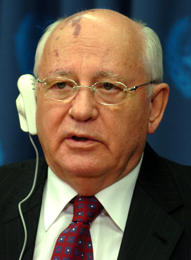 |
|
| Interactive discussions with UN organizations, Regional Commissions, specialized agencies and Bretton Woods institutions |
|
Kerstin Leitner, Assistant Director-General, WHO,
highlighted the need to address water and sanitation needs collectively while protecting the ecosystem, and urged multisectoral, multistakeholder, and public-private initiatives.
Jacques Diouf, Director-General, FAO,
emphasized that without resources, and unless the Monterrey commitments are honored, the MDGs will not be achieved until the year 2150.
Brigita Shmõgnerová, Executive Secretary/Under Secretary-General, Economic Commisssion for Europe, highlighted the regional dimension of efforts to achieve the MDGs. WMO highlighted the importance of high-quality shared data, and proposed a goal of reducing by half the number of deaths from natural disasters over the next 15 years. |
|
|
|
| |
Kul Gautam, Deputy Executive Director, UNICEF, highlighted water and sanitation services as a powerful means to break the cycle of poverty, observed that the lack of these services hinders education, and urged ministers to give particular prominence to school sanitation.
Klaus Toepfer, Executive Director, UNEP,
stressed that environmental and ecosystem services are essential, not a luxury.
Hama Arba Diallo, Executive Secretary, UN Convention to Combat Desertification,
highlighted the importance of IWRM in programmes being developed to combat desertification, and the role of UNCCD Networks. |
| |
|
| |
Jose Antonio Ocampo, Under Secretary-General for Economic and Social Affairs (left), noted comments from UN organizations on the importance of trade issues, support for public sector financing of water and sanitation services to the poor, and the use of cross-subsidization and bond markets as innovative tools.
Ian Johnson, Vice President, Environmentally and Socially Sustainable Development, World Bank, Len Good, CEO and Chairman, Global Environment Facility, and Jacques Diouf, Director-General, FAO (right) |
| |
|
| |
Kiyotaka Akasaka, OECD, with Dimitri Maximimichev, Russian FederationMichel Jarraud, Director-General, WMO, highlighted the importance of high-quality shared data, and proposed a goal of reducing by half the number of deaths from natural disasters over the next 15 years. |
| |
|
| |
Hamdallah Zedan, Executive Secretary, Convention on Biological Diversity (left); and The Prince of Orange, who was scheduled to be a keynote speaker, was unable to attend. However, his speech was presented by a Dutch official (right), who called on donors to meet ODA commitments and suggested that local-level participation and an integrated, sustainable strategy to achieve the MDGs be considered as conditions for funding. |
| |
|
|
| Dick Roche, Minister for Environment, Heritage and Local Government of Ireland, meets with Mikhail Gorbachev |
Australia (left) said
said achieving the MDGs requires economic growth, primarily driven by private investment and an enabling environment.
Miklos Persanyi, Minister of Environment, Hungary (right) |
|
| Interactive Discussions with Major Groups |
|
|
| |
|
|
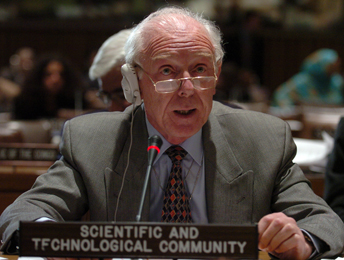 |
|
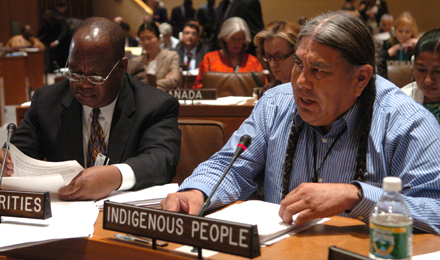
|
|
Representing the Scientific and Technological Community, Gisbert Glaser stressed the need for information and data collection with open access provided to all. FARMERS underscored the need to enhance the role of all stakeholders on equal footing
Representing Indigenous People, Tom Goldtooth, Indigenous Environmental Network, called for recognition of the right to self-determination in the CSD-13 outcome document.
|
|
|
South Africa expressed concern that the space provided at CSD-13 has constrained the participation of Major Groups, and said that her country had funded the participation of four major group representatives. .
Speaking for farmers, Christopher Schepis, International Federation of Agricultural Producers (center), underscored the need to enhance the role of all stakeholders on equal footing.
Speaking for Local Authorities, Amos Masondo, Mayor of Johannesburg (ICLEI), supported decentralization of responsibilities and resources.
|
|
| Speaking on behalf of the Women's group, Cayetana Carrion, WEDO, called for a rights-based approach, noted that achieving the sanitation target requires infrastructure, behavioral change, and social empowerment.
On behalf of Business and Industry, Steve Lennon, ESKOM,
underscored that "business does not support privatization of water resources," highlighting provision of water and sanitation services as a public service, whether operated by public or private entities.
Speaking for Trade Unions, David Boys, ICFTU, highlighted worker participation, decent jobs, and workplace health and safety as fundamental for sustainable development, and encouraged countries to take advantage of ILO technical assistance programmes. |
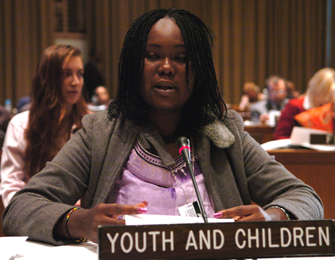 |
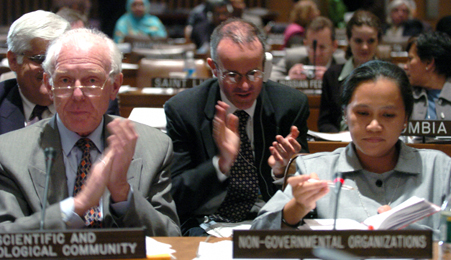 |
| Speaking for Children and Youth, Belinda Ndubuisi, Global Youth Action Network, urged changes in unsustainable consumption and production patterns and noted that youth-led projects are innovative, resourceful and cost-effective.
Speaking for NGOs, Neth Dano, Third World Network, receiving applause for her statement, when she urged a rights-based, pro-poor approach, scaled-up assistance, unconditional debt cancellation, fair trade, and a UN-based follow up mechanism on targets and plans. She said that "what countries give in aid, they shouldn't steal in trade." |
|
|
Negotiations of the Chair's Text
|
| |
|
| Press Conference with Mikhail Gorbachev and John Ashe |
| |
|
|
|
| Miscellanous Photos from the week |
|
|
|

